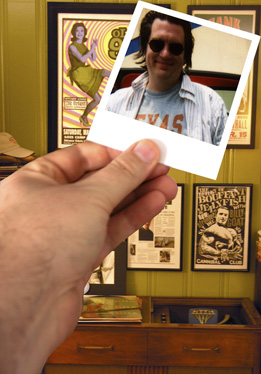
Although I think one of the biggest problems with the blogosphere is the tendency for people on the left and the right to spew forth about their ideology when in reality they are merely regurgitating the talking points set out by the party or some think tank. Hey, I’ve done it, too. But I’m a lot more interested in a person’s authentic inner or artistic life rather than how effectively a person toe’s the party line. I think that is where the medium becomes an art form.
With that in mind, let’s talk politics.
I’m supporting Kinky Friedman in his run for the governor’s mansion because I think he has a point: people get the kind of government they deserve. Something is seriously, spiritually wrong in Texas and it is up to the people to fix it.
I know that the problem isn’t just Texas. Special interests and their big money have a stranglehold on Washington, D.C., too. But if you live in Texas, you can’t do anything about D.C. This is a one-party state, the reddest of the red. It is going to take someone to seriously rock the boat in Washington and it ain’t coming from here.
But we can do something about it here in Texas. The Kinkster is an authentic, independent voice who is as fed up as I am and is prepared to do something about it. To paraphrase his talking points:
Education
An educated workforce and top-notch schools are essential to keeping our state attractive to new business, but we're failing the test.Texas has the 8th largest economy in the world, but we're 1st in drop-out rates and 49th in education spending in the country. Teachers' salaries in Texas are over $6,000 below the national average. This lack of respect for the people who do our state's most important job must stop. As governor, Kinky will work to make sure that teachers are paid what they're worth. Period. The TAKS test and its predecessor, TAAS, were invented essentially to make legislators look good on education. But studies show that rigid enforcement of standardized test scores doesn't help kids learn or make teachers more effective. Teach to the test and kids will learn the test—but not much else.
Healthcare
Texas ranks rock-bottom in providing for the basic needs of its youngest and poorest residents. More than one fifth of Texas children have no health insurance at all. In 2003, Texas legislators slashed the Children's Health Insurance Program, pulling the rug out from under 170,000 kids. Not only did this put more of our children at risk, it ended up costing the state tens of thousands of health care jobs and $16 billion in lost productivity. Kinky believes this is reckless and short-sighted—no way to invest in the future of Texas. We're a state that prides itself on friendliness and responsibility, but the message we're sending our kids is that if you're going to be born poor, you'd better not be born in Texas.
Renewable Energy
It's time for Texas to reclaim bragging rights as an energy icon. As governor, Kinky will accomplish that by encouraging investment and innovation in new methods of electricity generation and new fuels like biodiesel.
Think these are fringe technologies? Think again. Wind power plants, solar power arrays, and landfill gas capture systems are already in operation across Texas in cities from Fort Stockton to Fort Worth. Texas has been called "the Saudi Arabia of renewable energy," and firms from TXU to Kyocera are already clamoring for a piece of the action.Despite our staggering potential, only 0.7% of Texas' energy needs come from renewable sources. That puts us 51st in the nation, behind even Washington D.C. Biodiesel—it's good enough for Willie Nelson’s tour bus, and the city of Denton is using it to fuel their entire fleet of diesel trucks. Biodiesel is fuel you can grow. That's good for farmers, good for the air, good for the Texas energy industry and good for Texans. With biodiesel, everybody wins but OPEC.
OK, that’s the party line right there. I’ve never worked on a political campaign before, but I am now. If you live in Texas and are looking to vote for the Kinkster, here’s what you need to do:
Thanks for letting me on the soapbox. Back to your regularly-scheduled noodlings.

